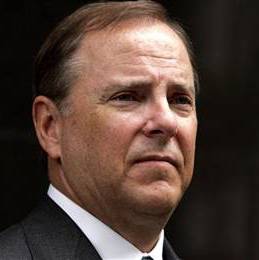 One of the many troubling aspects of the Enron Task Force’s prosecution of former Enron CEO Jeff Skilling is the “trial penalty” that Skilling faces in connection with his sentencing (which is next Monday, October 23rd).
One of the many troubling aspects of the Enron Task Force’s prosecution of former Enron CEO Jeff Skilling is the “trial penalty” that Skilling faces in connection with his sentencing (which is next Monday, October 23rd).
The trial penalty is the additional time that Skililng faces in prison because he chose to assert his Constitutional right to defend himself against the government’s charges in comparison to similarly-situated defendants, such as former Enron CFO Andrew Fastow (six years) — who copped a plea under a cooperation agreement with the Task Force — or former Enron chief accountant Richard Causey (no more than seven years), whose deal with the Task Force does not include an obligation to cooperate in other cases.
Exhibiting the same professional integrity that Joseph Grundfest recently displayed in the sad case of Jamie Olis, University of Illinois law professor and criminal law expert Margareth Etienne has filed an amicus curie brief in connection with the October 23rd Skilling sentencing hearing. Professor Etienne bears down on the key issue (citations are omitted):
[A] plea discount must be differentiated from a trial penalty. A plea discount–or a limited reduction such as acceptance of responsibility that takes into account factors such as a guilty plea–have been deemed constitutional; but a trial penalty–a punishment for exercising Fifth and Sixth Amendment rights–would clearly be unconstitutional insofar as it would violate the “unconstitutional conditions” doctrine. The “unconstitutional conditions” doctrine simply states that the imposition of a penalty for exercising a constitutional right creates an unconstitutional condition. Imposing a sentence on Mr. Skilling that is several times that of the sentences faced by his co-defendants–when the only material distinction between their cases appears to be Mr. Skilling’s decision to go to trial–strongly suggests that Mr. Skilling is being penalized for exercising his constitutional rights. This is particularly true in a determinate sentencing (or guideline) regime where the potential benefits bestowed on co-defendants for acceptance of responsibility (and cooperation with the government, when applicable) are easily quantifiable.
Accordingly, the question for sentencing courts is whether there is a point at which a permissible plea discount becomes an impermissible and unconstitutional trial penalty. At the very least, when the disparity in sentences between similarly situated defendants can no longer be attributed to easing the government’s burden by entering a resource-saving guilty plea, such a disparity risks being an unconstitutional trial penalty. Such an unjustified disparity, when it violates norms of fundamental fairness and proportionality, may also rise to the level of a Fifth and Fourteenth Amendment violation.
Not only is the trial penalty a horrifying injustice for individuals such as Skilling, it is also a substantial factor in the great waste of the government’s dubious regulation of business-through-criminalization policy.

No material difference between their cases? There is a grave injustice that anyone suffer more time than Fastow, Glisan and Kopper in the Enron case, whether or not they went to trial. No one else made millions on the side unbeknownst to everyone in the company. Skilling should not serve any where close to as much time as Fastow. In fact, fairness would dictate that the sentences be reversed. The fear of virtual life in prison forced multiple defendants to plead (and promise to sing the Government song) or risk Skilling’s fate.
Professor Etienne only touches on what may be the most serious problem caused by this sentencing disparity, i.e. the disparity encourages much more than ìacceptance of responsibilityî and results in something other than the ìefficient administration of justice.î Targets in multi-target prosecutions faced with the reality of this disparity are tempted to falsely implicate themselves and others under the guise of accepting responsibility, thereby raising the pressure on those who might consider exercising their right to trial to similarly implicate themselves and others. Itís a vicious cycle and the resulting ìconvictionsî much too often have nothing to do with the actual underlying conduct.
Kenny Boy unconvicted
Kenny Boy Lay’s criminal record has been officially wiped clean. Former Enron Chairman Ken Lay’s criminal conviction was vacated and…